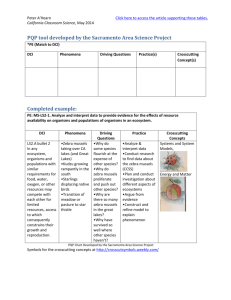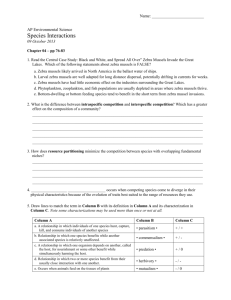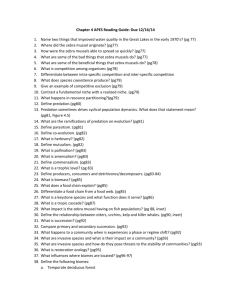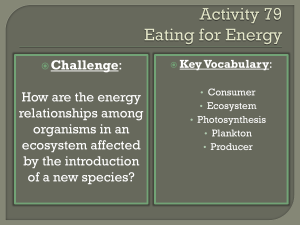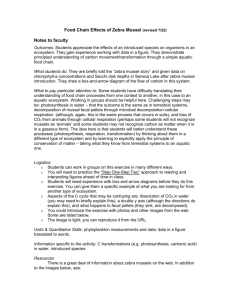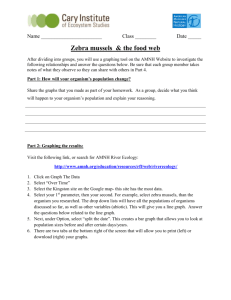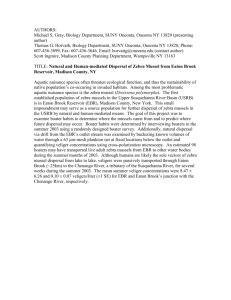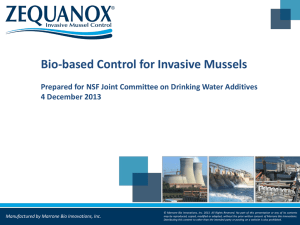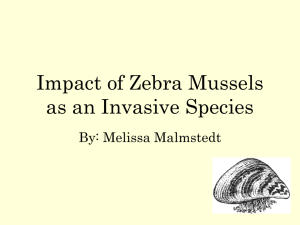OPVL Zebra Mussels
advertisement
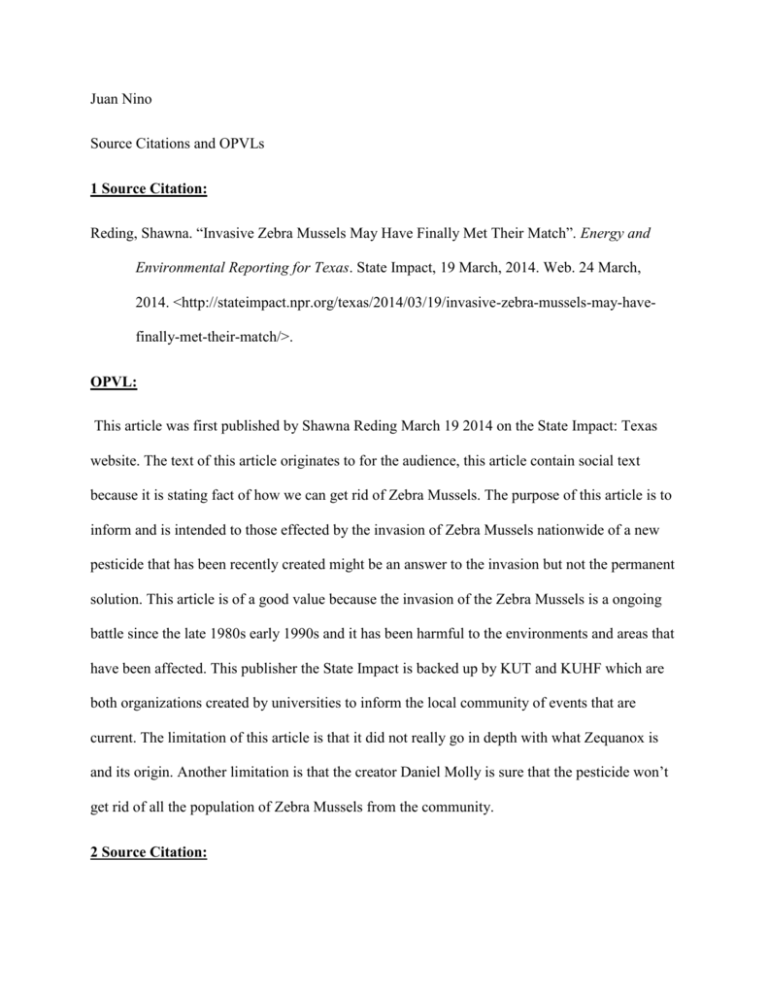
Juan Nino Source Citations and OPVLs 1 Source Citation: Reding, Shawna. “Invasive Zebra Mussels May Have Finally Met Their Match”. Energy and Environmental Reporting for Texas. State Impact, 19 March, 2014. Web. 24 March, 2014. <http://stateimpact.npr.org/texas/2014/03/19/invasive-zebra-mussels-may-havefinally-met-their-match/>. OPVL: This article was first published by Shawna Reding March 19 2014 on the State Impact: Texas website. The text of this article originates to for the audience, this article contain social text because it is stating fact of how we can get rid of Zebra Mussels. The purpose of this article is to inform and is intended to those effected by the invasion of Zebra Mussels nationwide of a new pesticide that has been recently created might be an answer to the invasion but not the permanent solution. This article is of a good value because the invasion of the Zebra Mussels is a ongoing battle since the late 1980s early 1990s and it has been harmful to the environments and areas that have been affected. This publisher the State Impact is backed up by KUT and KUHF which are both organizations created by universities to inform the local community of events that are current. The limitation of this article is that it did not really go in depth with what Zequanox is and its origin. Another limitation is that the creator Daniel Molly is sure that the pesticide won’t get rid of all the population of Zebra Mussels from the community. 2 Source Citation: “Zebra Mussel” Invasive Aquatic Animals. Minnesota Department of Natural Resources, n.d. Web. 24 March, 2014.< http://www.dnr.state.mn.us/invasives/aquaticanimals/ zebramussel/index.html>. OPVL: This article originated and was first published by the Minnesota Department of Natural Resources. The purpose of this article is intended for a general audience and is to inform the audience of the general characteristics of zebra mussels and that the invaders are causing drastic changes to the environments in which they are now thriving in that they don’t have a predator that has the capacity to keep up with their rapid growth. This article has value even though it has no author or date of publication because all of the information is coming from the Minnesota Department of Natural Resources. The limitations of this article is that in the impact section that talks about the impacts the zebra mussel have they leave out a ton of impacts like the fact that they are known for clogging up many pipes, waterways, and cause millions of dollars’ worth of damage. Another limitation is that they don’t mention any efforts that the government and scientist are making in order to control and eradicate this invasive species. 3 Source Citation: “Invasive Mussels” Threats to animal wildlife. National Wildlife Federation, n.d. Web. 25 March, 2014. <http://www.nwf.org/Wildlife/Threats-to-Wildlife/InvasiveSpecies/Invasive-Mussels. aspx>. OPVL: This source originates from the national wildlife federation and the knowledge that they have researched. The purpose of this article is intended to the people and inform of the invasive species of the zebra mussels and what it has done to the ecosystems that they now currently thrive in. The value of this article is based on the fact that the national wildlife federation is an organization that is a nonprofit organization that is dedicated into the protection of wildlife and the habitat of the wildlife. The limitation of this source is that the article is based on the research that has been accumulated by the NWF and not from other organizations and scientist. 4 Source Citation: “Zequanox”. Marrone Bio Innovations, n.d. Web. 25 March, 2014. <http://www. marronebioinnovations.com/products/brand/zequanox/>. OPVL: The origin of this article is from the data base of Marrone Bio Innovations which is the company that has created the Zequanox. The purpose of this article is to inform the people that are being affected by the invasive species that there is a way to control the population of the Zebra Mussels without harming any of the native species. The value of this article is that it is written by the creators of the new aquatic pesticide. The limitation of this article is that there are no other manufactures of Zequanox than Marrone Bio Innovations and all the available information is provided by them so there is no other information to compare to. 5 Source Citation: “Frequently Asked Questions About the Zebra Mussels” USGS, 3 September, 2013. Web. 30 March, 2014.< http://fl.biology.usgs.gov/Nonindigenous_Species/Zebra_mussel_FAQs/zebra_mussel_ faqs . html>. OPVL: The origin of this article is on “Frequently Asked Questions About the Zebra Mussels” is from the United States Geological Survey which is a government funded organization with scientist that survey the health of ecosystems. The purpose of this article is to answer frequently asked question of the Zebra Mussels. The value of this article is that this information on Zebra Mussel comes from government based data collected by scientist. The limitation of the origin and purpose is that all of the data is based only on the American government and does not include information based of of other government or scientist around the world. 6 Source Citation: “Zebra Mussels” Fishing and Boating Access. Mass.Gov, n.d. Web. 31 March, 2014 <http://www.mass.gov/eea/agencies/dfg/fba/zebra-mussels.html>. OPVL: The origin of the article “Zebra Mussels” is a published article by the government of Massachusetts. The purpose of the article is to inform readers of the economic affects, environmental affects and how we can prevent the spread of Zebra Mussels. The value of this article is that the data is coming from the Massachusetts government. The limitation of of the origin and purpose is that the data comes from the database of the Massachusetts government, the information by the Massachusetts government isn’t as accurate as the data from states that are greatly affected by the Zebra Mussels. 7 Source Citation: “Zebra Mussels Reported in 255 Michigan Inland Lakes”. Michigan State University, n.d. Web.31 March , 2014.<http://research.msu.edu/stories/zebra-mussels-reported-255-michigan-inlandlakes>. OPVL: The origin of the article “Zebra Mussels Reported in 255 Michigan Inland Lakes” was posted by Michigan State University. The purpose of this article is to inform the readers of Economic and ecosystem affects that the rapid population growth of Zebra Mussels can cause. The value of the article comes from the fact that it was written and posted by Michigan State University which is one of the primary universities that are researching in depth to aid their community and others. The limitation of the origin and purpose of the article is that he acquired data is based only off of Michigan State University’s conducted research and is not compared with the other data accumulated from other universities and governments researching to solve this issue as well. 8 Source Citation: Thomas, Julian. “Zebra Mussels Filter System” You Need A Zebra Mussel Filter If: Zebra Mussel Filter System Inc., n.d. Web. 31 March, 2014.< http://zebramussel.com/>. OPVL: The Origin of this Article on “Zebra Mussel Filtration System” comes from the company that produces the systems which is called Zebra Mussel Filtration System Inc. The purpose of this article is to inform the citizens that live near a body of water and use water from that body of water that there is a filtration system that will prevent the growth of zebra mussels in the pipes. The value of this article comes from the fact that this information is provided by the company itself that produces the filtration system. The limitation of the origin is that that their article is that it does not tell the reader and buyer exactly how it works or installation. The limitation of the purpose is that the article uses loaded language to persuade the reader to buy their filtration system and they make is seem that ist the best solution here is on the market. 9 Source Citation: “Zebra Mussels” Invasive Aquatic Species. University of Wisconsin Sea Grant Institute, n.d. Web. 31 March, 2014< http://www.seagrant.wisc.edu/Home/Topics/InvasiveSpecies/Details.aspx?PostID =655>. OPVL: The origin of the article “Zebra Mussels” is written and posted by the University of Wisconsin Sea Grant Institute. The purpose of this article is to inform and educate readers of ways to prevent the spread of Zebra Mussels into other bodies of water. The value of the article is given due to the fact that its data is composed of research done by the University of Wisconsin Sea Grant Institute. The limitation of the origin and purpose is that the research is based on the database off o the research conducted by the University of Wisconsin Sea Grant Institute and does not take in to account the research done by other university or state government investigating the issue and compare and contrast data.
